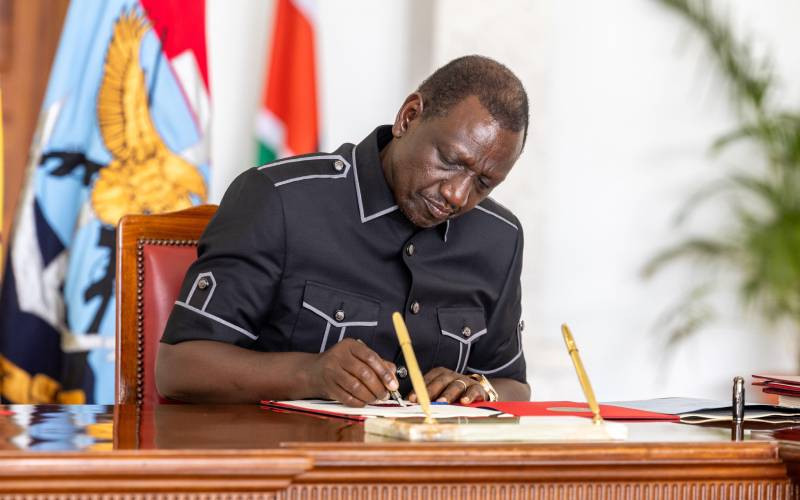 |
|
Chinua |
Politics of language and politicians of language have dominated the literary pages of Standard in past few weekends. Mukoma wa Ngugi has urged the promotion of local languages, a position I totally agree with, while Abenea Ndago has decried cultural mimicry — he has been spot on.
On the other hand, Stephen Derwent Partington seems torn between celebrating the Africanisation of English and the right to a language of choice. In all this, the lowest common multiple has been language.
This debate will not abate soon, yet it is not entirely new. A few questions though, why should we Africanise English or adopt Kenyanese?
Could this be an indictment of our misuse of English, so that if we Africanised it, would we express ourselves better? Or should we just Africanise for the sake of Africanising and adopt Kenyanese as an act of rebellion? What is Kenyanese? Is it a ‘language’ that Kenyans agree upon?
When Ng?ug?i wa Thiong’o stopped writing in English, he said that to be truly free of Africa’s old European masters, one must write in an African language. He opined that Europe forced its languages on Africa to control it.
AFRICA IS NOT THE WEST
To Ng?ug?i, those writing in European languages were handmaidens of imperialism. The Bolejeka critics — outraged touts for the passenger lorries of African literature — Chinweizu Ibekwe, Onwuchekwa Jemie and Ihechukwu Madubuike, stated, rather bluntly, that Africa is not the West.
One of the recipients of this fire was the late Chinua Achebe. They suggested going back to the fireside for stylistics. In defence of his practise and use of English, Achebe stated that he does not write to the world in a world language, English, neither does he write for the Whiteman in a white language.
He stated that he wrote to Nigerians in English because that was the only way he could reach them considering the number of languages — over two hundred — spoken in Nigeria. He took cognisance of the fact that by writing in his mother tongue, Igbo, he could only reach a section of Nigeria.Importantly, and this is the thrust of my argument, Achebe noted that he was lucky to have a mother tongue that did not face the danger of extinction. What would Achebe have done if Igbo faced the danger of extinction? Indeed, this is what makes me agree with Mukoma’s suggestion.
UNESCO estimates that if nothing is done, 6000 plus languages spoken today will disappear by the end of the century, taking with them cultural wealth and ancestral knowledge. However, they advise that this scenario can be avoided by putting in places policies to maintain or revitalise mother tongues and teach them to younger generation.
“Languages are who we are. By protecting them, we protect ourselves,” observed UNESCO Director General Irina Bokova in 2012. As we are being asked to Africanise English or adopt Kenyanese, the BBC is maintaining a culture of having stories — in English — read on radio. The British Council on the other hand runs a course on language and culture where it teaches people, who would like to learn English — as a global language, British culture, thereby improving their English language skills!
KENYANESE IS OBSCURE
At the end of the week, those attending the course are asked to express their feelings, in a short piece of writing. Shouldn’t we be doing the same?
Apart from putting local languages at the danger of extinction, we will be doing exactly what Partington is against, by Africanising or adopting Kenyanese. Partington says that he considers Standard English, which he detests, to be “a myth imposed, within Britain, by the elite upon a ‘provincial’ majority who are daily made to feel inferior because of their dialect differences; differences maligned as ‘inferiorities’.”
Won’t it, therefore, be unfair to impose what is spoken in Nairobi to the rest of the country? Kenya is a country with two official languages, Kiswahili (which also doubles as the national language) and English.
Stay informed. Subscribe to our newsletter
Kenyanese and Africanised English are not used across the country. The sheng’ spoken in Eastlands is very different from what is spoken by mababi in the leafy suburbs of Nairobi. The difference is further stretched as one ventures out into the counties. Indeed, what we call Kenyanese is an obscure animal whose definition and or standardisation may never be realised. It will keep mutating from one generation to the other. Of course, it will be foolhardy for anyone to imagine that he or she can use local languages and reach a wide audience.
Anyone who writes in mother tongue, as Achebe rightly puts it, is writing for a section of the country. However, this should not neuter the life and potential in our mother tongues.
Even though Kenyan writers have a right to choose, they should also know that they have an obligation to preserve our languages for posterity. They should not shirk this obligation by hiding in this so-called right!
We would not have this right had our founding fathers run away from their responsibility of preserving our languages. We have to remember that what we say influences what we think, what we feel and what we believe.
Language, literature and culture are interlinked. Employ Kenyanese and we will be trapped as we will talk, think, and feel in this hype until a new generation comes with something different. This is partly what makes some people think that local languages are inferior or that speaking or writing in them is a sign of being uncivilised.
KISWAHILI IS THREATENED
Partington says he knows writers who speak their mother tongues yet write in English. I wonder whether he has ever asked them why they do it. Could it be that they cannot express themselves better in their mother tongues? Alternatively, could it be that they are either afraid and or ashamed of their mother tongues? I do not think so. My opinion is that this is the result of conditioning and the need to reach a wider audience. It does not mean, however, that they are incapable of telling their stories in their mother tongues. Certainly, they should be encouraged to do so.
Though it may seem expensive, Kenyan writings should be translated into our mother tongues. This will enable consumption at the local level while retaining readership at the national and international level.
The county governments should borrow a leaf from countries like Uganda, Zambia and Malawi and teach local languages in the formative years. The national government should introduce the study of local languages at the tertiary level. Like Makerere University, our local universities should establish at least a department of African languages. Efforts like those of Mukoma wa Ngugi of establishing the Mabati-Cornell Kiswahili Prize for African Literature should be praised.
Apart from the prize money, that many people are seeing, this award will encourage more writers to pen our experiences thereby keeping alive Kiswahili which is threatened especially by sheng.
This prize will also imbue pride in the writers and the owners of Kiswahili. Teach languages, and Kenyanese will take care of itself.
 The Standard Group Plc is a
multi-media organization with investments in media platforms spanning newspaper
print operations, television, radio broadcasting, digital and online services. The
Standard Group is recognized as a leading multi-media house in Kenya with a key
influence in matters of national and international interest.
The Standard Group Plc is a
multi-media organization with investments in media platforms spanning newspaper
print operations, television, radio broadcasting, digital and online services. The
Standard Group is recognized as a leading multi-media house in Kenya with a key
influence in matters of national and international interest.
 The Standard Group Plc is a
multi-media organization with investments in media platforms spanning newspaper
print operations, television, radio broadcasting, digital and online services. The
Standard Group is recognized as a leading multi-media house in Kenya with a key
influence in matters of national and international interest.
The Standard Group Plc is a
multi-media organization with investments in media platforms spanning newspaper
print operations, television, radio broadcasting, digital and online services. The
Standard Group is recognized as a leading multi-media house in Kenya with a key
influence in matters of national and international interest.








